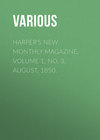Читать книгу: «Harper's New Monthly Magazine, Volume 1, No. 3, August, 1850.», страница 3
His last great deed had hardly ceased to echo over the land, before the people began to mark him out for their highest gift. He coveted no such distinction, and constantly expressed a wish that Henry Clay might be the chosen one. But the popular purpose grew stronger and stronger; and General Taylor was named for the Presidency by one of the great political parties of the country. During the political contest he remained steadfastly true to himself. He neither stooped nor swerved, neither sought nor shunned. He was borne by a triumphant majority to the Presidential chair, and in a way that has impelled the most majestic intellect of the nation to declare, that "no case ever happened in the very best days of the Roman Republic, where any man found himself clothed with the highest authority of the State, under circumstances more repelling all suspicion of personal application, all suspicion of pursuing any crooked path in politics, or all suspicion of having been actuated by sinister views and purposes."
The Inaugural Address of President Taylor was redolent with old-fashioned patriotism, and breathed the very spirit of Washington. And his subsequent administration, though beset by sectional strifes of fearful violence, was conducted with wisdom, firmness, equanimity, and moderation, on great national principles, and for great national ends. Owing to his profound deference to the co-ordinate branches of government, and his inability to either dictate or assume, his policy in reference to some of the exciting questions of the day was not, during the short period of his administration, fully proclaimed to Congress, and pressed upon its adoption; but, though a southern man and a slaveholder, he had deliberately and explicitly declared himself in favor of the prompt and untrammeled admission of California into the Union. He was taken away in the midst of the controversy, just as he was about to submit his views upon the subject to the representatives of the people. His last public appearance was in doing homage to Washington, on the birthday of our liberties, and his last official act was adding a new guaranty to the peace of the world, by signing the convention recently concluded between our country and Great Britain respecting Central America. Disease soon did its work. Confronting Death with the fearless declaration, "I am prepared – I have endeavored to do my duty," the old hero succumbed – his first and last surrender.
General Taylor married in early life a lady of Virginia, and was connected either by affinity or blood with many of the most noted families of the Old Dominion. His excellent consort, a son, and a daughter, survive him. In person, General Taylor was about five feet eight inches in height, and like most of our revolutionary generals, was inclined to corpulency. His hair was gray, his brow ample, his eye vivid, and his features plain, but full of firmness, intelligence, and benevolence. His manners were easy and cordial, his dress, habits, and tastes simple, and his style of living temperate in the extreme. His speeches and his official papers, both military and civil, are alike famed for their propriety of feeling and their chastity of diction. His private life was unblemished, and the loveliness of his disposition made him the idol of his own household and the favorite of all who knew him. His martial courage was only equaled by his Spartan simplicity, his unaffected modesty, his ever wakeful humanity, his inflexible integrity, his uncompromising truthfulness, his lofty magnanimity, his unbounded patriotism, and his unfaltering loyalty to duty. His mind was of an original and solid cast, admirably balanced, and combining the comprehensiveness of reason with the penetration of instinct. Its controlling element was a strong, sterling sense, that of itself rendered him a wise counselor and a safe leader. All of his personal attributes and antecedents made him pre-eminently a man of the people, and remarkably qualified him to be the stay and surety of his country in this its day of danger.
A braver soldier never wielded sword —
A gentler heart did never sway in council.
But he is dead – and millions weep his loss.
[From "Hunting Adventures in South Africa."]
ENCOUNTER WITH A LIONESS
Suddenly I observed a number of vultures seated on the plain about a quarter of a mile ahead of us, and close beside them stood a huge lioness, consuming a blesblok which she had killed. She was assisted in her repast by about a dozen jackals, which were feasting along with her in the most friendly and confidential manner. Directing my followers' attention to the spot, I remarked, "I see the lion;" to which they replied, "Whar? whar? Yah! Almagtig! dat is he;" and instantly reining in their steeds and wheeling about, they pressed their heels to their horses' sides, and were preparing to betake themselves to flight. I asked them what they were going to do. To which they answered, "We have not yet placed caps on our rifles." This was true; but while this short conversation was passing the lioness had observed us. Raising her full, round face, she overhauled us for a few seconds, and then set off at a smart canter toward a range of mountains some miles to the northward; the whole troop of jackals also started off in another direction; there was, therefore, no time to think of caps. The first move was to bring her to bay, and not a second was to be lost. Spurring my good and lively steed, and shouting to my men to follow, I flew across the plain, and, being fortunately mounted on Colesberg, the flower of my stud, I gained upon her at every stride. This was to me a joyful moment, and I at once made up my mind that she or I must die.
The lioness having had a long start of me, we went over a considerable extent of ground before I came up with her. She was a large, full-grown beast, and the bare and level nature of the plain added to her imposing appearance. Finding that I gained upon her, she reduced her pace from a canter to a trot, carrying her tail stuck out behind her, and slewed a little to one side. I shouted loudly to her to halt, as I wished to speak with her, upon which she suddenly pulled up, and sat on her haunches like a dog, with her back toward me, not even deigning to look round. She then appeared to say to herself, "Does this fellow know who he is after?" Having thus sat for half a minute, as if involved in thought, she sprang to her feet, and, fating about, stood looking at me for a few seconds, moving her tail slowly from side to side, showing her teeth, and growling fiercely. She next made a short run forward, making a loud, rumbling noise like thunder. This she did to intimidate me; but, finding that I did not flinch an inch, nor seem to heed her hostile demonstrations, she quietly stretched out her massive arms, and lay down on the grass. My Hottentots now coming up, we all three dismounted, and, drawing our rifles from their holsters, we looked to see if the powder was up in the nipples, and put on our caps. While this was doing the lioness sat up, and showed evident symptoms of uneasiness. She looked first at us, and then behind her, as if to see if the coast were clear; after which she made a short run toward us, uttering her deep-drawn murderous growls. Having secured the three horses to one another by their rheims, we led them on as if we intended to pass her, in the hope of obtaining a broadside. But this she carefully avoided to expose, presenting only her full front. I had given Stofulus my Moore rifle, with orders to shoot her if she should spring upon me, but on no account to fire before me. Kleinboy was to stand ready to hand me my Purdey rifle, in case the two-grooved Dixon should not prove sufficient. My men as yet had been steady, but they were in a precious stew, their faces having assumed a ghastly paleness, and I had a painful feeling that I could place no reliance on them.
Now, then, for it, neck or nothing! She is within sixty yards of us, and she keeps advancing. We turned the horses' tails to her. I knelt on one side, and, taking a steady aim at her breast, let fly. The ball cracked loudly on her tawny hide, and crippled her in the shoulder, upon which she charged with an appalling roar, and in the twinkling of an eye she was in the midst of us. At this moment Stofolus's rifle exploded in his hand, and Kleinboy, whom I had ordered to stand ready by me, danced about like a duck in a gale of wind. The lioness sprang upon Colesberg, and fearfully lacerated his ribs and haunches with her horrid teeth and claws; the worst wound was on his haunch, which exhibited a sickening, yawning gash, more than twelve inches long, almost laying bare the very bone. I was very cool and steady, and did not feel in the least degree nervous, having fortunately great confidence in my own shooting; but I must confess, when the whole affair was over, I felt that it was a very awful situation, and attended with extreme peril, as I had no friend with me on whom I could rely.
When the lioness sprang on Colesberg, I stood out from the horses, ready with my second barrel for the first chance she should give me of a clear shot. This she quickly did; for, seemingly satisfied with the revenge she had now taken, she quitted Colesberg, and, slewing her tail to one side, trotted sulkily past within a few paces of me, taking one step to the left. I pitched my rifle to my shoulder, and in another second the lioness was stretched on the plain a lifeless corpse. In the struggles of death she half turned on her back, and stretched her neck and fore arms convulsively, when she fell back to her former position; her mighty arms hung powerless by her side, her lower jaw fell, blood streamed from her mouth, and she expired. At the moment I fired my second shot, Stofolus, who hardly knew whether he was alive or dead, allowed the three horses to escape. These galloped frantically across the plain, on which he and Kleinboy instantly started after them, leaving me standing alone and unarmed within a few paces of the lioness, which they, from their anxiety to be out of the way, evidently considered quite capable of doing further mischief.
Such is ever the case with these worthies, and with nearly all the natives of South Africa. No reliance can be placed on them. They will to a certainty forsake their master in the most dastardly manner in the hour of peril, and leave him in the lurch. A stranger, however, hearing these fellows recounting their own gallant adventures, when sitting in the evening along with their comrades round a blazing fire, or under the influence of their adored "Cape smoke" or native brandy, might fancy them to be the bravest of the brave. Having skinned the lioness and cut off her head, we placed her trophies upon Beauty and held for camp. Before we had proceeded a hundred yards from the carcass, upward of sixty vultures, whom the lioness had often fed were feasting on her remains.
[From Dickens's "Household Words."]
THE YOUNG ADVOCATE
Antoine de Chaulieu was the son of a poor gentleman of Normandy, with a long genealogy, a short rent-roll, and a large family. Jacques Rollet was the son of a brewer, who did not know who his grandfather was; but he had a long purse and only two children. As these youths flourished in the early days of liberty, equality, and fraternity, and were near neighbors, they naturally hated each other. Their enmity commenced at school, where the delicate and refined De Chaulieu being the only gentilhomme among the scholars, was the favorite of the master (who was a bit of an aristocrat in his heart) although he was about the worst dressed boy in the establishment, and never had a son to spend; while Jacques Rollet, sturdy and rough, with smart clothes and plenty of money, got flogged six days in the week, ostensibly for being stupid and not learning his lessons – which, indeed, he did not – but, in reality, for constantly quarreling with and insulting De Chaulieu, who had not strength to cope with him. When they left the academy, the feud continued in all its vigor, and was fostered by a thousand little circumstances arising out of the state of the times, till a separation ensued in consequence of an aunt of Antoine de Chaulieu's undertaking the expense of sending him to Paris to study the law, and of maintaining him there during the necessary period.
With the progress of events came some degree of reaction in favor of birth and nobility, and then Antoine, who had passed for the bar, began to hold up his head and endeavored to push his fortunes; but fate seemed against him. He felt certain that if he possessed any gift in the world it was that of eloquence, but he could get no cause to plead; and his aunt dying inopportunely, first his resources failed, and then his health. He had no sooner returned to his home, than, to complicate his difficulties completely, he fell in love with Mademoiselle Natalie de Bellefonds, who had just returned from Paris, where she had been completing her education. To expatiate on the perfections of Mademoiselle Natalie, would be a waste of ink and paper; it is sufficient to say that she really was a very charming girl, with a fortune which, though not large, would have been a most desirable acquisition to De Chaulieu, who had nothing. Neither was the fair Natalie indisposed to listen to his addresses; but her father could not be expected to countenance the suit of a gentleman, however well-born, who had not a ten-sous piece in the world, and whose prospects were a blank.
While the ambitions and love-sick young barrister was thus pining in unwelcome obscurity, his old acquaintance; Jacques Rollet, had been acquiring an undesirable notoriety. There was nothing really bad in Jacques' disposition, but having been bred up a democrat, with a hatred of the nobility, he could not easily accommodate his rough humor to treat them with civility when it was no longer safe to insult them. The liberties he allowed himself whenever circumstances brought him into contact with the higher classes of society, had led him into many scrapes, out of which his father's money had one way or another released him; but that source of safety had now failed. Old Rollet having been too busy with the affairs of the nation to attend to his business, had died insolvent, leaving his son with nothing but his own wits to help him out of future difficulties, and it was not long before their exercise was called for. Claudine Rollet, his sister, who was a very pretty girl, had attracted the attention of Mademoiselle de Bellefonds' brother, Alphonso; and as he paid her more attention than from such a quarter was agreeable to Jacques, the young men had had more than one quarrel on the subject, on which occasions they had each, characteristically, given vent to their enmity, the one in contemptuous monosyllables, and the other in a volley of insulting words. But Claudine had another lover more nearly of her own condition of life; this was Claperon, the deputy governor of the Rouen jail, with whom she had made acquaintance during one or two compulsory visits paid by her brother to that functionary; but Claudine, who was a bit of a coquette, though she did not altogether reject his suit, gave him little encouragement, so that betwixt hopes, and fears, and doubts, and jealousies, poor Claperon led a very uneasy kind of life.
Affairs had been for some time in this position, when, one fine morning, Alphonse de Bellefonds was not to be found in his chamber when his servant went to call him; neither had his bed been slept in. He had been observed to go out rather late on the preceding evening, but whether or not he had returned, nobody could tell. He had not appeared at supper, but that was too ordinary an event to awaken suspicion; and little alarm was excited till several hours had elapsed, when inquiries were instituted and a search commenced, which terminated in the discovery of his body, a good deal mangled, lying at the bottom of a pond which had belonged to the old brewery. Before any investigations had been made, every person had jumped to the conclusion that the young man had been murdered, and that Jacques Rollet was the assassin. There was a strong presumption in favor of that opinion, which further perquisitions tended to confirm. Only the day before, Jacques had been heard to threaten Mons. de Bellefonds with speedy vengeance. On the fatal evening, Alphonse and Claudine had been seen together in the neighborhood of the now dismantled brewery; and as Jacques, betwixt poverty and democracy, was in bad odor with the prudent and respectable part of society, it was not easy for him to bring witnesses to character, or prove an unexceptionable alibi. As for the Bellefonds and De Chaulieus, and the aristocracy in general, they entertained no doubt of his guilt, and, finally, the magistrate; coming to the same opinion, Jacques Rollet was committed for trial, and as a testimony of good will. Antoine de Chaulieu was selected by the injured family to conduct the prosecution.
Here, at last, was the opportunity he had sighed for! So interesting a case, too, furnishing such ample occasion for passion, pathos, indignation! And how eminently fortunate that the speech which he set himself with ardor to prepare, would be delivered in the presence of the father and brother of his mistress, and, perhaps, of the lady herself! The evidence against Jacques, it is true, was altogether presumptive; there was no proof whatever that he had committed the crime; and for his own part, he stoutly denied it. But Antoine de Chaulieu entertained no doubt of his guilt, and his speech was certainly well calculated to carry that conviction into the bosom of others. It was of the highest importance to his own reputation that he should procure a verdict, and he confidently assured the afflicted and enraged family of the victim that their vengeance should be satisfied. Under these circumstances could any thing be more unwelcome than a piece of intelligence that was privately conveyed to him late on the evening before the trial was to come on, which tended strongly to exculpate the prisoner, without indicating any other person as the criminal. Here was an opportunity lost. The first step of the ladder on which he was to rise to fame, fortune, and a wife, was slipping from under his feet.
Of course, so interesting a trial was anticipated with great eagerness by the public, and the court was crowded with all the beauty and fashion of Rouen. Though Jacques Rollet persisted in asserting his innocence, founding his defense chiefly on circumstances which were strongly corroborated by the information that had reached De Chaulieu the preceding evening – he was convicted.
In spite of the very strong doubts he privately entertained respecting the justice of the verdict, even De Chaulieu himself, in the first flush of success, amid a crowd of congratulating friends, and the approving smiles of his mistress, felt gratified and happy: his speech had, for the time being, not only convinced others, but himself; warmed with his own eloquence, he believed what he said. But when the glow was over, and he found himself alone, he did not feel so comfortable. A latent doubt of Rollet's guilt now burst strongly on his mind, and he felt that the blood of the innocent would be on his head. It is true there was yet time to save the life of the prisoner, but to admit Jacques innocent, was to take the glory out of his own speech, and turn the sting of his argument against himself. Besides, if he produced the witness who had secretly given him the information, he should be self-condemned, for he could not conceal that he had been aware of the circumstance before the trial.
Matters having gone so far, therefore, it was necessary that Jacques Rollet should die; so the affair took its course; and early one morning the guillotine was erected in the court-yard of the jail, three criminals ascended the scaffold, and three heads fell into the basket, which were presently afterward, with the trunks that had been attached to them, buried in a corner of the cemetery.
Antoine de Chaulieu was now fairly started in his career, and his success was as rapid as the first step toward it had been tardy. He took a pretty apartment in the Hôtel Marbœuf, Rue Grange-Batelière, and in a short time was looked upon as one of the most rising young advocates in Paris. His success in one line brought him success in another; he was soon a favorite in society, and an object of interest to speculating mothers; but his affections still adhered to his old love Natalie de Bellefonds, whose family now gave their assent to the match – at least, prospectively – a circumstance which furnished such an additional incentive to his exertions, that in about two years from the date of his first brilliant speech, he was in a sufficiently flourishing condition to offer the young lady a suitable home. In anticipation of the happy event, he engaged and furnished a suite of apartments in the Rue du Helder; and as it was necessary that the bride should come to Paris to provide her trousseau, it was agreed that the wedding should take place there, instead of at Bellefonds, as had been first projected; an arrangement the more desirable, that a press of business rendered Mons. de Chaulieu's absence from Paris inconvenient.
Brides and bridegrooms in France, except of the very high classes, are not much in the habit of making those honeymoon excursions so universal in this country. A day spent in visiting Versailles, or St. Cloud, or even the public places of the city, is generally all that precedes the settling down into the habits of daily life. In the present instance St. Denis was selected, from the circumstance of Natalie's having a younger sister at school there; and also because she had a particular desire to see the Abbey.
The wedding was to take place on a Thursday; and on the Wednesday evening, having spent some hours most agreeably with Natalie, Antoine de Chaulieu returned to spend his last night in his bachelor apartments. His wardrobe and other small possessions, had already been packed up and sent to his future home; and there was nothing left in his room now, but his new wedding suit, which he inspected with considerable satisfaction before he undressed and lay down to sleep. Sleep, however, was somewhat slow to visit him; and the clock had struck one, before he closed his eyes. When he opened them again it was broad daylight; and his first thought was, had he overslept himself? He sat up in bed to look at the clock which was exactly opposite, and as he did so, in the large mirror over the fire-place, he perceived a figure standing behind him. As the dilated eyes met his own, he saw it was the face of Jacques Rollet. Overcome with horror he sunk back on his pillow, and it was some minutes before he ventured to look again in that direction; when he did so, the figure had disappeared.
The sudden revulsion of feeling such a vision was calculated to occasion in a man elate with joy, may be conceived! For some time after the death of his former foe, he had been visited by not unfrequent twinges of conscience; but of late, borne along by success, and the hurry of Parisian life, these unpleasant remembrancers had grown rarer, till at length they had faded away altogether. Nothing had been further from his thoughts than Jacques Rollet, when he closed his eyes on the preceding night, nor when he opened them to that sun which was to shine on what he expected to be the happiest day of his life! Where were the high-strung nerves now? The elastic frame? The bounding heart?
Heavily and slowly he arose from his bed, for it was time to do so; and with a trembling hand and quivering knees, he went through the processes of the toilet, gashing his cheek with the razor, and spilling the water over his well-polished boots. When he was dressed, scarcely venturing to cast a glance in the mirror as he passed it, he quitted the room and descended the stairs, taking the key of the door with him for the purpose of leaving it with the porter; the man, however, being absent, he laid it on the table in his lodge, and with a relaxed and languid step proceeded on his way to the church, where presently arrived the fair Natalie and her friends. How difficult it was now to look happy, with that pallid face and extinguished eye!
"How pale you are! Has any thing happened? You are surely ill?" were the exclamations that met him on all sides. He tried to carry it off as well as he could, but felt that the movements he would have wished to appear alert, were only convulsive; and that the smiles with which he attempted to relax his features, were but distorted grimaces. However, the church was not the place for further inquiries; and while Natalie gently pressed his hand in token of sympathy, they advanced to the altar, and the ceremony was performed; after which they stepped into the carriage waiting at the door, and drove to the apartments of Madme. de Bellefonds, where an elegant déjeuner was prepared.
"What ails you, my dear husband?" inquired Natalie, as soon as they were alone.
"Nothing, love," he replied; "nothing, I assure you, but a restless night and a little over-work, in order that I might have to-day free to enjoy my happiness!"
"Are you quite Sure? Is there nothing else?"
"Nothing, indeed; and pray don't take notice of it, it only makes me worse!"
Natalie was not deceived, but she saw that what he said was true; notice made him worse; so she contented herself with observing him quietly, and saying nothing; but as he felt she was observing him, she might almost better have spoken; words are often less embarrassing things than too curious eyes.
When they reached Madame de Bellefonds' he had the same sort of questioning and scrutiny to undergo, till he grew quite impatient under it, and betrayed a degree of temper altogether unusual with him. Then every body looked astonished; some whispered their remarks, and others expressed them by their wondering eyes, till his brow knit, and his pallid cheeks became flushed with anger. Neither could he divert attention by eating; his parched mouth would not allow him to swallow any thing but liquids, of which, however, he indulged in copious libations; and it was an exceeding relief to him when the carriage, which was to convey them to St. Denis, being announced, furnished an excuse for hastily leaving the table. Looking at his watch, he declared it was late; and Natalie, who saw how eager he was to be gone, threw her shawl over her shoulders, and bidding her friends good morning, they hurried away.
It was a fine sunny day in June; and as they drove along the crowded boulevards, and through the Porte St. Denis, the young bride and bridegroom, to avoid each other's eyes, affected to be gazing out of the windows; but when they reached that part of the road where there was nothing but trees on each side, they felt it necessary to draw in their heads, and make an attempt at conversation. De Chaulieu put his arm round his wife's waist, and tried to rouse himself from his depression; but it had by this time so reacted upon her, that she could not respond to his efforts, and thus the conversation languished, till both felt glad when they reached their destination, which would at all events furnish them something to talk about.
Having quitted the carriage, and ordered a dinner at the Hôtel de l'Abbaye, the young couple proceeded to visit Mademoiselle Hortense de Bellefonds, who was overjoyed to see her sister and new brother-in-law, and doubly so when she found that they had obtained permission to take her out to spend the afternoon with them. As there is little to be seen at St. Denis but the Abbey, on quitting that part of it devoted to education, they proceeded to visit the church, with its various objects of interest; and as De Chaulieu's thoughts were now forced into another direction, his cheerfulness began insensibly to return. Natalie looked so beautiful, too, and the affection betwixt the two young sisters was so pleasant to behold! And they spent a couple of hours wandering about with Hortense, who was almost as well informed as the Suisse, till the brazen doors were open which admitted them to the royal vault. Satisfied, at length, with what they had seen, they began to think of returning to the inn, the more especially as De Chaulieu, who had not eaten a morsel of food since the previous evening, owned to being hungry; so they directed their steps to the door, lingering here and there as they went, to inspect a monument or a painting, when, happening to turn his head aside to see if his wife, who had stopped to take a last look at the tomb of King Dagobert, was following, he beheld with horror the face of Jacques Rollett appearing from behind a column! At the same instant, his wife joined him, and took his arm, inquiring if he was not very much delighted with what he had seen He attempted to say yes, but the word would not be forced out; and staggering out of the door, he alleged that a sudden faintness had overcome him.
They conducted him to the Hôtel, but Natalie now became seriously alarmed; and well she might. His complexion looked ghastly, his limbs shook, and his features bore an expression of indiscribable horror and anguish. What could be the meaning of so extraordinary a change in the gay, witly, prosperous De Chaulieu, who, till that morning, seemed not to have a care in the world? For, plead illness as he might, she felt certain, from the expression of his features, that his sufferings were not of the body but of the mind; and, unable to imagine any reason for such extraordinary manifestations, of which she had never before seen a symptom, but a sudden aversion to herself, and regret for the step he had taken, her pride took the alarm, and, concealing the distress, she really felt, she began to assume a haughty and reserved manner toward him, which he naturally interpreted into an evidence of anger and contempt. The dinner was placed upon the table, but De Chaulieu's appetite, of which he had lately boasted, was quite gone, nor was his wife better able to eat. The young sister alone did justice to the repast; but although the bridegroom could not eat, he could swallow Champagne in such copious draughts, that ere long the terror and remorse that the apparition of Jacques Rollet had awakened in his breast were drowned in intoxication. Amazed and indignant, poor Natalie sat silently observing this elect of her heart, till overcome with disappointment and grief, she quitted the room with her sister, and retired to another apartment, where she gave free vent to her feelings in tears.





















